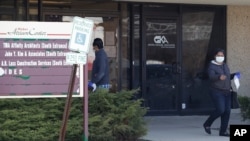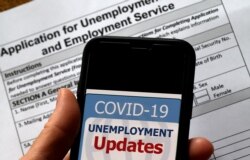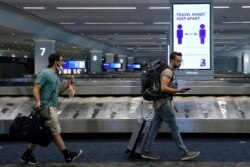Another 1.3 million laid-off U.S. workers filed for unemployment compensation last week, the Labor Department reported Thursday, as the world’s biggest economy struggles in the face of a surging number of new coronavirus cases.
It was the 17th straight week that the number of benefit claims had dropped, but only by 10,000 in the week ending July 11 from the previous week. The single-week high of 6.9 million claims came in March, but the recent four-week rolling average of nearly 1.4 million claims a week remains historically high.
In all, the government said about 17.3 million workers remain unemployed even as millions of workers have returned to their jobs. A total of 51 million workers have collected jobless benefits at some point in the last four months.
The unemployment benefit claim figures since mid-March have been staggering, easily topping the 695,000 total in one week in 1982 that had been the highest on record until the coronavirus pandemic swept into the United States.
Millions of the unemployed have returned to work, but those still left without work are facing new financial difficulties, with the national government’s $600-a-week boost to less generous state unemployment benefits set to expire in two weeks, at the end of July. In addition, economic experts say that employers have cut millions of jobs off their ledgers, leaving one-time workers with nothing to return to, or have permanently closed their businesses.
The White House and Congress are considering what additional aid, if any, laid-off workers should get from the federal government, but no decisions are likely until the end of July. Some additional boost to the U.S. economy is likely, however, but the money could go to businesses or state and local governments rather than directly to taxpayers or the unemployed.
Smaller federal unemployment benefits — such as $200 to $400 a week on top of state aid — are possible but not a certainty.
U.S. President Donald Trump has said he supports another round of $1,200 stimulus payments to most taxpayers, even as some of his fellow Republicans have voiced concerns about the country’s ever-increasing national debt that now totals more than $26 trillion. Some lawmakers have called for incentive payments to returning workers, some of whom have collected more in unemployment benefit payments than from their previous salaries.
Trump’s daughter, White House adviser Ivanka Trump, had advice this week for the unemployed whose jobs have been wiped out by the pandemic: “Find something new.”
Her pitch was part of a new government jobs initiative aimed at boosting the benefits of skills training and career paths that do not require a college degree.
Trump administration critics on social media immediately ridiculed the jobs plan as “clueless” and “tone deaf” considering the country is facing an unrelenting surge in new coronavirus cases and an economic recession because of the pandemic.
Numerous brand-named corporations are retrenching.
United Airlines says it is laying off more than a third of its 95,000 workers. Brooks Brothers, an upscale men’s clothier that first opened for business in 1818, filed for bankruptcy. Bed Bath and Beyond said it will close 200 stores.
Some Federal Reserve officials have voiced fears that the economic recovery is faltering. But President Trump, facing a difficult November re-election contest against former vice president Joe Biden, has remained upbeat.
“I created the greatest economy we’ve ever had,” he said days ago. “And now we’re creating it again.”
The Commerce Department reported Thursday that retail sales climbed 7.5% in June after a sharp upswing in May, with federal stimulus checks and tax refunds giving some Americans more money to spend. But fears of the coronavirus spread could hinder further advances in the coming months.
The U.S. is now recording more than 60,000 new coronavirus cases a day. The U.S. leader has wrongly called them 99% “totally harmless,” with many of the patients requiring hospitalization.
The southern tier of U.S. states that had escaped the brunt of the pandemic in March and April has been particularly hard hit. Their governors reopened businesses — too soon, some now acknowledge — and younger people started socializing in public again at bars and restaurants without embracing such safe practices as wearing a face mask or social distancing themselves from others by at least two meters.
Now, some state governors are ordering these businesses shut down again. Investment banker Goldman Sachs said 70% of the country has either reversed reopening plans or delayed them.
Key U.S. economic officials are predicting that the country’s full recovery from the pandemic will take a lengthy period, extending well into 2021.
The Bureau of Labor Statistics has said the country’s unemployment rate improved to 11.1% in June, compared to the official May figure of 13.3%. But the June figure was compiled at mid-month before the surge of new coronavirus cases.
The Federal Reserve has predicted that U.S. unemployment will fall to 9.3% by the end of this year and to 6.5% by the end of 2021, a rosier advance than some economists are forecasting.
The U.S. death toll from the coronavirus has now topped 137,000, by far the most of any country in the world, and health experts predict tens of thousands more will die in coming months.








